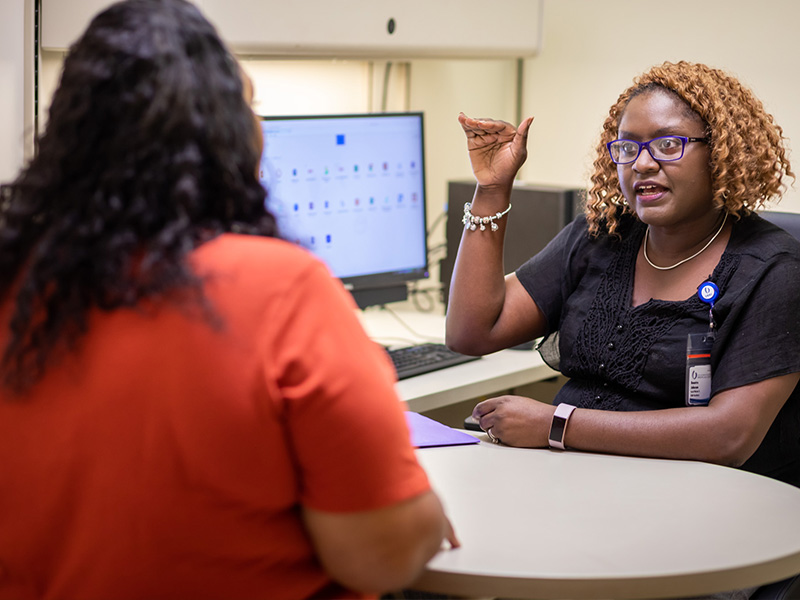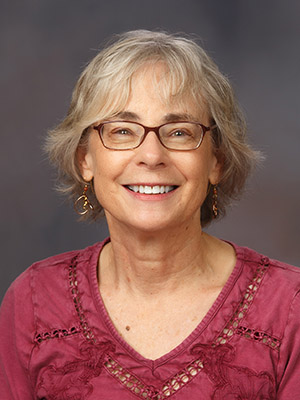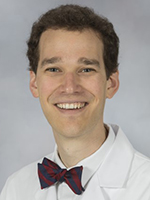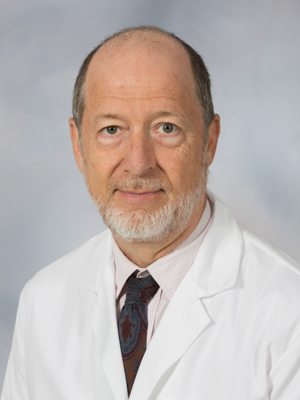Patients living with HIV receive “Helping HAND” to conquer addictions

Living with HIV is hard enough, but coping with substance abuse on top of that has been a heavy burden for Rosemary Hall.
“I was at a younger age, going through things with my father’s death,” she said. “That’s when the alcoholism and drug use began. When I was a street person, I contracted HIV.”
The Jackson resident said she sought treatment, “but they never seemed to help me. They gave me pills, but that wasn’t helping me mentally.”
It was at the University of Mississippi Medical Center Adult Special Care Clinic that Hall finally found the support she desperately needs. “They said, ‘We have the Helping HAND program. Would you like to join?’” Hall remembered.
Hall is among more than 60 patients receiving treatment for substance abuse disorders at the clinic for patients living with HIV at the Jackson Medical Mall. Helping HAND, which stands for Helping to Advance in New Directions, is a federal grant-funded initiative that’s fast become an integral part of the clinic.

Helping HAND “has been wildly successful,” said Dr. Deborah Konkle-Parker, professor of infectious diseases medicine. “You can really see that lives are changed.”
Konkle-Parker and the clinic team saw a need for Helping HAND, which received initial support in 2017 with patient screening beginning a year later, as a way to help those with HIV keep that disease in check. The clinic also offers care for patients with Hepatitis C.
“Our take on it was that if we can increase viral suppression in people living with HIV, then we would decrease transmission in the community,” Konkle-Parker said. “People with substance abuse disorders are much more likely not to be virally suppressed.”

“The rising rates of opioid use disorder are affecting Mississippi as they are the rest of the country, and substance abuse disorders have an impact not just on health, but patients’ ability to manage their chronic illnesses,” said Dr. Ben Brock, assistant professor of infectious diseases medicine and the clinic’s medical director.
“Addressing issues like unmet social needs and comorbid conditions, such as psychiatric disorders and substance abuse, are important strategies to treat other chronic illnesses that require routine appointments and medications.”
The clinic team includes infectious disease physicians and nurse practitioners, psychologists with expertise in substance abuse, registered nurses and licensed clinical social workers.
How Helping HAND works: Patients seen for HIV answer a questionnaire on a tablet computer before their appointment. They indicate what substances they are using, how often and how much.
“If there is an overuse of a substance, it flags the start of a couple of different questionnaires,” Konkle-Parker said. “The questions give the person a sense of the consequences of their use. If someone is negative, the tablet calculates that and sends a message to the provider.
“We use language that is motivational for the patient: Nice job! You are doing a fantastic job!” Konkle-Parker said.
If a person is positive for a low-level drug or alcohol disorder, “very few patients have any readiness to change” and might believe the consequences aren’t that severe, Konkle-Parker said. If they are occasionally using marijuana, for example, staff gives them education on its dangers.
If their substance abuse is at a higher level, including the use of drugs other than marijuana, staff offers them the next higher level of counseling and education.
“The provider might say that it would be better for their HIV care for them to focus on their substance abuse, and that if it’s OK with the patient, we have someone who can talk to you,” Konkle-Parker said. “We have a nurse trained in motivational interviewing who will talk to them about reducing their level of use.”
If the patient is at very high risk and dependent upon drugs or alcohol, the care team introduces them to the Helping HAND program. Those who choose to enroll receive substance abuse treatment that takes place at the clinic, eliminating their need to travel to a different location for services, and they receive referrals for mental health care if they need it.
“We have a self-help program and a peer advocate for them at the clinic. We pay for transportation for them to come to and from appointments related to their substance abuse,” Konkle-Parker said.
The hope is that patients will be frank on the questionnaire so that they can receive help, Konkle-Parker said. “It’s not our role to decide if they are honest or not,” she said. “The constructive thing is to set up a therapeutic relationship. We plant a seed with the screening questions. When they tell us, we want to be responsive in a way that encourages them to seek treatment or decrease their use.”

Dr. Jefferson Parker, a professor in the Department of Psychiatry and Human Behavior, provides individual substance abuse treatment to Helping HAND patients, referring those who need it to Psychiatry for medication-assisted treatment or therapy for depression, anxiety or other mental health challenges.
Patients generally fall into one of three categories, he said. “One is a patient who is completely overwhelmed with substance abuse, and their life is falling apart. My first role is to get them into a structured residential rehabilitation program. Before I start working with them, I might refer them to Harbor House, or detox and then Harbor House.
“Another group is individuals who perhaps are using both cocaine and marijuana,” Parker said. “They might be having problems with the cocaine now, but not with marijuana. I work with them to first become abstinent from cocaine.”
Such a patient would receive motivational treatment, earning a gift card for a negative drug screen for cocaine, the value increasing with each negative screen. Because the screenings are a regular part of most appointments, “we know what’s going on with them,” Parker said.
The third group is patients who have gotten off drugs or alcohol, but need the tools to prevent relapse, such as developing a support system and avoiding people, places and things that would lead them down a bad path.
The clinic takes a holistic approach to care, Brock said. “We do routine substance abuse and mental health screenings for the issues identified that aren’t normally addressed in the health care setting in a lot of clinics,” he said. “And even in the non-HIV population, substance use disorder and other mental health illnesses are commonly present together.”
The clinic takes part in the federal Ryan White HIV/AIDS program, meaning it’s committed to providing care to people living with HIV, regardless of their ability to pay.
“One of the biggest pushes in the Ryan White programs nationwide is to offer core services on site,” Brock said. “Part of that is because of the stigma associated with going to other health care sites. Having ready access to those services increases patients’ uptake of those services.”
“This kind of intervention – screening and treatment for substance abuse disorders in primary and subspecialty care – that’s where the future is,” Parker said. “This is innovative and powerful. I hope that as time goes on, this will be something that can be supported without having a grant to pay for it.”
Hall said she never misses her appointments at the clinic and appreciates seeing the same staff each time. “Every time I go there, they listen,” she said. “They are there for me.”
Managing her addictions is challenging, Hall said. “I’m struggling because of my surrounding area, knowing that I see the guys out there that sell the drugs. But I haven’t used since I joined Helping HANDS, and I love them (the Helping HANDS team) for that.
“It’s not like other places, where they see you for 10 minutes and write you a prescription. Are they really listening?” she said. “With Helping HAND, they have helped me tremendously. I am making progress.”

